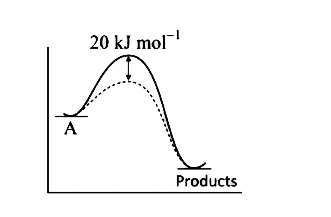For following reactions A700K−−→Product
A500K−−→Product
it was found that the Ea is decreased by 30 kJ/mol in the presence of catalyst. If the rate remains unchanged , the activation energy for catalysed reaction if (Assume pre exponential factor is same)
75 kJ/mol
105 kJ /mol
135 kJ/mol
198 kJ/mol
The correct Answer is:A
Step by step video, text & image solution for For following reactions Aoverset(700K)rarrProduct Aoverset(500K)rarrProduct it was found that the E_a is decreased by 30 kJ/mol in the presence of catalyst. If the rate remains unchanged , the activation energy for catalysed reaction if (Assume pre exponential factor is same) by Chemistry experts to help you in doubts & scoring excellent marks in Class 12 exams.
Related Playlists
Knowledge Check
- Question 1 - Select One
For following reactions
A400K−−→ Product
A200K−−−−−→catalyst Product
it was found that the Ea is decreased by 20 kJ/ mol in the presence of catalyst. If the rate remains unchanged, the activation energy for catalysed reaction is ( Assume per exponential factor is same ) :A40 kJ/ molB20kJ /molC80kJ/molD35kJ/mol - Question 1 - Select One
For the following reactions. .
A600K−−→ Product
A400K−−−−→ catalyst Product It was found that the Ea is decreased by 40kJ / mol in the presence of catalyst . If the rate remains uncharged the activations energy for catalyzed reactions is [Assume per exponnetial factor is same:]A105 kJ/ molB120 kJ / molC75 kJ/molD135 kJ/mol - Question 1 - Select One
An organic reaction is carried out at 500 K. If the same reaction carried out in the presence of a catalyst at the same rate, the temperature required is 400 K. What is the activation energy of the uncatalysed reaction if catalyst lowers the Ea by 20 kJ/mol?
A110 kJ/molB10 kJ/molC100 kJ/molD1000 kJ/mol - Question 1 - Select One
The rate of a catalysed reaction at 27∘C is e2 times the rate of uncatalysed reaction at 727∘C. If the catalyst decreased the activation energy by 6 Kcal/mol, the activation energy of uncatalysed reaction is (consider the same value of pre-exponential factors in both cases):
A487 Kcal/molB67 Kcal/molC907 Kcal/molD6 Kcal/mol - Question 1 - Select One
At 227∘C , the presence of catalyst causes the activation energy of a reaction to decrease by 4.606Kcal.The rate of the reaction will be increased by :−
A2 timesB10 timesC100 timesD1000 times - Question 1 - Select One
Arrhenius studied the effect of temperature on the rate of a reaction and postulated that rate constant varies with temperature exponentially as k=Ae−Ea/RT. For most of the reactions, it was found that the temperature coefficient of the reaction lies between 2 to 3. The method is generally used for finding the activation energy of a reaction. Keeping temperature constant, the effect of catalyst on the activation energy has also been studied by studying how much the rate of reaction changes in the presence of catalyst. In most of the cases, it is observed that catalyst lowers the activation energy barrier and increases the rate of reaction.
The pre-exponential factor in the Arrhenus equation of second order reaction has the unitsAmol L−1s−1BL mol−1s−1Cs−1Ddimensionless - Question 1 - Select One
The reaction Ak−−→ Products, is zero order while the reaction Bk−−→ Product, is 1st order. For what initial concentration of A the half lives of the two reactions are equal?
A2 MBln 2 MC2 log 2 MD2 ln 2M
Similar Questions
For the following reaction,
A500K−−→ Products
A400K/catalyst−−−−−−−−→ Product
If (−d[A]dt)500K=−(d[A]dt)400K
no catalyst in presence of catalyst Then Ea is approximately :
 View Solution
View SolutionA chemical reaction occur at the same rate at 500K as at 300K" in presence of catalyst.If catalyst decreases the activation energy by "35kJ/mole , then calculate the activation energy of uncatalysed reaction (in kJ/mole)
View SolutionThe energy of activation for a reaction is 100KJmol−1. The peresence of a catalyst lowers the energy of activation by 75%. What will be the effect on the rate of reaction at 20∘C, other things being equal?
View Solution

